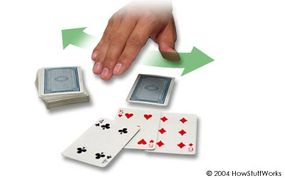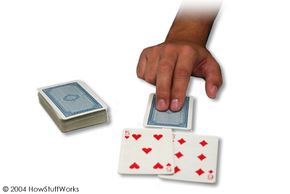Table Etiquette
Although the game itself is simple, there are casino rules and traditions that are important to follow in order to avoid a reprimand from the dealer.
- Once you've place your bet, don't touch the chips. The dealer might think you're trying to sneak extra chips into your bet because you have a good hand.
- If you're doubling down, place the additional chips next to the original chips that you bet, not on top of them. The dealer doesn't always count your bet ahead of time, so he might think you're adding more than double to your bet when you mix the two together.
- In a London Deal game, in which you get your cards face up, do not touch your cards. Casinos prohibit this to prevent players from marking the cards in some way.
- If you're playing Nevada Deal, you'll have to pick up your cards to look at them. Never touch them with two hands, and don't handle the cards more than necessary. Always keep them above the table, in plain sight.
- Making your play at a blackjack table is not quite as simple as telling the dealer, "Hit me," or "Stand." In a crowded, noisy casino, it would be very easy for the dealer to misunderstand what you say, or hear the play at another table and think it was yours. That's why hand signals are required.
- The dealer's eyes will be on the cards almost all the time. When you want another card, say, "Hit me," and make a brushing or scratching motion behind your cards. (If you're holding your cards, you can brush them against the table behind your bet.) Imagine that you're making a slight, subtle, upside-down "Come here" motion, and you'll get the idea.
- The signal for standing is a small wave of the hand while saying, "Stay," or "Stand." Imagine that someone has just offered you a large slice of pie, but you just ate and you're stuffed. That "No, thanks" hand motion is similar to the signal for stand. (Alternately, slide your cards face down under your bet.)

- It's vital to pay attention at the table. One story goes: A gambler looked away for a brief moment when a waitress asked if he wanted a drink. He inadvertently left his winnings from the previous hand in the betting circle (a substantial amount), and turned around to find the dealer had dealt him in with a $500 bet. Before he had a chance to complain, he glanced down to find he had been dealt a natural blackjack. That was a surprise happy ending, but his inattention at a key moment could easily had led to a huge loss.
- Tipping the dealer, known as toking, is customary but not required. The usual practice is to place the chips you're tipping with on the edge of the betting area between you and the dealer. You're actually betting the tip for the dealer. If you win the hand, the dealer gets twice the tip. If you lose, the dealer gets nothing.
- It's a good idea to exchange your cash for chips at the casino's cage before you start playing. However, there is usually a cash box at the blackjack table. You can place the money you want to play with on the table, and the dealer will exchange it for chips. In some casinos, you might even be allowed to bet with cash, but your winnings will be returned as chips. The dealer can't and won't change your chips back into cash -- it's back to the casino cage for that. The dealer will, however, allow you to trade in stacks of small-denomination ships for larger-denomination ships.
Now you know how to play blackjack. Next, we'll learn how to win.
Advertisement
